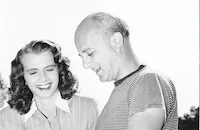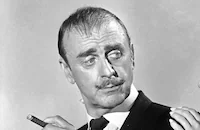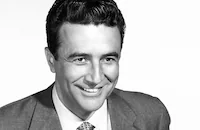Aladdin and His Lamp
Cast & Crew
Lew Landers
Patricia Medina
John Sands
Richard Erdman
John Dehner
Billy House
Film Details
Technical Specs

Synopsis
In Bagdad, notorious pickpocket Aladdin reacts with disgust as Prince Bokra arrives to woo the hand of the Caliph's daughter, beautiful Princess Jasmine. Magician Mahmud watches Aladdin skillfully steal Bokra's coin pouch, deposit it with the all-seeing blind man Billah, and then escape the prince's guards by hiding in the store of his friend Mirza. That night, Aladdin decides to risk the punishment of death by stealing a glimpse of Jasmine in her palace home. Mahmud again watches from the shadows as the young man enters Jasmine's room. Although the princess is impressed with Aladdin's physique and courage, she slaps him upon recognizing him as a common thief. Unfazed, he sweeps her into a passionate kiss, then races out, only steps ahead of the guards. After Aladdin once more fights and escapes the guards, Mahmud appears before him and offers great wealth and power if he will take on a dangerous assignment. Aladdin accepts, and although he expertly climbs down into a treacherous cavern and, as instructed, retrieves a lamp, Mahmud will not let him back out until he hands over the lamp. For his own safety, Aladdin refuses, and Mahmud seals the entrance shut. Back in the cavern, Aladdin rubs the lamp in frustration, releasing a Genie inside. The Genie explains that every wish he grants also affords him the chance to appear in disguise in order to kill the lamp's owner and win his freedom from the lamp prison. Undaunted, Aladdin wishes to be a prince in order to court Jasmine, and is immediately transported to a vast palace, with Mirza as his vizier. As soon as Mirza visits town, the Genie knocks him out and, assuming his guise, returns to Aladdin's palace to kill him. As soon as he pulls out a sword, however, Aladdin beats him, and the Genie disappears in a puff of smoke. Aladdin then visits Jasmine and explains about the lamp. Despite her interest, she spurns him, but later informs Bokra that she will marry a thief instead of him. Dejected, Aladdin wishes for a beautiful woman to be his companion, and is rewarded with the lovely Passion Flower. The moment he kisses her, however, Jasmine enters his room to ask forgiveness and sees them. Just then, Mahmud steals the lamp and wishes away all of Aladdin's gains. The palace disappears, leaving Aladdin, Mirza and Jasmine in the desert. Although Jasmine swears their love is enough, Aladdin points out that he must remain a prince if they are to marry, and leaves to search for the lamp. He learns the location of Mahmud's palace from Billah and there grabs the lamp, only to be held at knifepoint by the magician. Aladdin convinces Mahmud to allow him to make all the wishes on the lamp, thus taking on the Genie's vengeance, in return for one wish of his own, to be a prince again. Meanwhile, Jasmine returns to her palace and is immediately taken prisoner by Bokra, who has killed her father and taken over the throne. Aladdin, again a prince, soon rescues her, and they flee from the guards into a secret cavern. There, the Genie materializes to fight for his freedom, but disappears after Aladdin once again defeats him. Outside, the couple is captured by a slave dealer named Gobbo. At the public sale the next day, a stranger helps Aladdin escape, after which Jasmine is sold into Bokra's harem. When Gobbo reveals that the new slave claims to be a princess, Bokra realizes her real identity and brings her to the torture chamber. Meanwhile, Aladdin's liberator turns out to be Mahmud's henchman, who delivers him to the magician in order to perform another wish. Aladdin beats up the henchman and, securing the lamp, races to the palace. There, he reaches the torture pit just as the walls of Jasmine's cell begin to close in on her. Aladdin fights with Bokra until the Caliph flees for his life, and then frees Jasmine moments before she is crushed by the walls. They race through a secret passageway, but outside, Bokra awaits them. He grabs the lamp and wishes to have Aladdin and Jasmine at his mercy in the torture pit, and although his wish is granted, the Genie appears and kills Bokra before he can carry out his cruel plan. The freed Genie informs Aladdin and Jasmine that the lamp will now gain a new inhabitant, but any imprisoned genie will wreak the same revenge, because the wishes themselves, and the greed they contain, are the real roots of evil and destructiveness. The happy couple take their thrones without the lamp, having nothing more to wish for.

Director

Lew Landers
Cast
Patricia Medina
John Sands
Richard Erdman

John Dehner
Billy House

Ned Young
Noreen Nash

Rick Vallin
Charles Horvath
Sujata
Arabella
Steve Roberts
Joe Mcguinn
Fred Berest
Madi Comfort
Baines Barron
John Bleifer
John Hart
Norman Bishop
Norma Barron
Joan Jordan
Pat Mckay
Joan T. Barton
Doreen Reese
Dorothy Johnson
Carol Varga
Sue Casey
Suzan Ball
Sally Seaver
Judy Walsh
Mona Knox
Judy Landon
Peggy Deegan
Wee Willie Davis
Charles Wagenheim
Allen Mathews
Paul Bryar
Crew
Howard Anderson
Irvin Berwick
Howard Dimsdale
Ted Haworth
Wilton R. Holm
Millard Kaufman
John Kean
Rose Loewinger
David Milton
Edward Morley Jr.
Jack Ogilvie
Robert Priestley
Ben Remington
Sam Roeca
Ben Schwalb
Clifford D. Shank
Marlin Skiles
Walter Wanger
Walter Wanger
Gilbert Warrenton
Allen K. Wood
Yvonne Wood

Film Details
Technical Specs

Quotes
Trivia
Notes
The film begins with a written foreword detailing the kindness of the "Caliph" and his successor to the throne of Bagdad, "Princess Jasmine", who faces danger from the evil "Prince Bokra" but will be aided by the expert pickpocket "Aladdin" and the Magical Lamp of Great Wonder. Although the first few titles of the opening credits were not visible on the print viewed, information in reviews and the Catalog of Copyright Entries indicates that Walter Wanger, Patricia Medina and John Sands are listed above the title. The copyright record also includes Sam Roeca as a writer, although he was not listed in the onscreen credits.
A July 1951 Hollywood Reporter news item indicates that Ben Schwalb began as the sole producer of the film, but Wanger, who was at that point the film's technical advisor, took over when Schwalb's schedule became too busy. According to an April 1952 Hollywood Citizen-News article, Charles Haas sued Citadel Pictures for $52,000 for failing to credit him for his part in making the film. Haas claimed to have directed a series of shorts for television based on the Aladdin character which, after he failed to find a television distributor, were made into Aladdin and His Lamp. The disposition of the suit is not known, and it has not been determined what part Citadel Pictures played in the production or distribution of the picture.
The character of "Aladdin" and tales from The Arabian Nights have appeared in many films, including the 1917 Fox feature Aladdin and the Wonderful Lamp, directed by C. M. Franklin and starring Francis Carpenter (see AFI Catalog of Feature Films, 1911-20); Columbia's 1951 release entitled Thief of Damascus (see below); the 1951 M-G-M film The Wonders of Aladdin, directed by Henry Levin and starring Donald O'Connor (see AFI Catalog of Feature Films, 1951-60); and the animated 1992 Disney production Aladdin, featuring Robin Williams as the voice of the "Genie."












